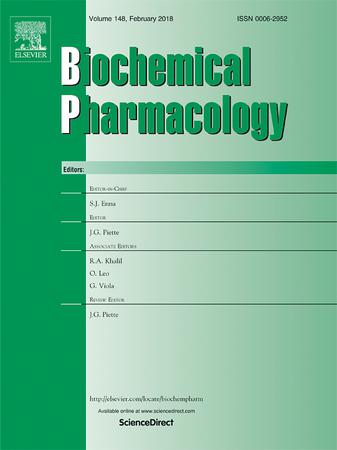Regulatory T cells and their role in inflammatory bowel disease: molecular targets, therapeutic strategies and translational advances
IF 5.6
2区 医学
Q1 PHARMACOLOGY & PHARMACY
引用次数: 0
Abstract
Regulatory T cells (Tregs) are essential for immune tolerance and for controlling pathological inflammation, particularly in mucosal tissues such as the gastrointestinal tract. Inflammatory bowel disease (IBD), which includes Crohn’s disease (CD) and ulcerative colitis (UC), is increasingly associated with Treg dysfunction. This dysfunction is marked by loss of lineage stability, impaired suppressive function, and a disrupted balance with pro-inflammatory T helper type 17 (Th17) cells. Advances in molecular immunology have identified key pathways that control Treg differentiation, epigenetic maintenance, and metabolic signaling. These include interleukin-2/signal transducer and activator of transcription 5 (IL-2/STAT5), forkhead box P3/conserved non-coding DNA sequences 2 (FOXP3/CNS2), mechanistic target of rapamycin (mTOR), and retinoic acid-related orphan receptor gamma t (RORγt) pathways, several of which are genetically linked to IBD susceptibility and offer viable targets for therapeutic development.
This structural and biochemical mechanisms contribute to Treg instability in IBD and evaluates pharmacological strategies aimed at restoring immune balance. Therapeutic strategies include small molecules, antibody therapies, and cell-based approaches that support Treg expansion, stabilize lineage identity, or enhance suppressive function. We emphasize interventions supported by genetic and translational evidence, positioning Treg modulation as a promising direction for precision therapy in IBD. The review also discusses ongoing clinical trials and future opportunities involving omics-driven patient stratification, targeted delivery platforms, and chimeric antigen receptor (CAR)-Treg technologies to improve treatment outcomes.

调节性T细胞及其在炎症性肠病中的作用:分子靶点、治疗策略和转化进展。
调节性T细胞(Tregs)对免疫耐受和控制病理性炎症至关重要,特别是在胃肠道等粘膜组织中。炎症性肠病(IBD),包括克罗恩病(CD)和溃疡性结肠炎(UC),越来越多地与Treg功能障碍相关。这种功能障碍的特征是谱系稳定性丧失,抑制功能受损,以及与促炎T辅助型17 (Th17)细胞的平衡被破坏。分子免疫学的进展已经确定了控制Treg分化、表观遗传维持和代谢信号传导的关键途径。其中包括白细胞介素-2/信号转导和转录激活因子5 (IL-2/STAT5), forkhead box P3/保守非编码DNA序列2 (FOXP3/CNS2),雷帕霉素的机制靶点(mTOR)和视黄酸相关孤儿受体γt (RORγt)途径,其中一些与IBD易感性遗传相关,为治疗开发提供了可行的靶点。这种结构和生化机制有助于IBD中Treg不稳定,并评估旨在恢复免疫平衡的药理学策略。治疗策略包括小分子、抗体疗法和基于细胞的方法,这些方法支持Treg扩增、稳定谱系身份或增强抑制功能。我们强调由遗传和翻译证据支持的干预措施,将Treg调节定位为IBD精确治疗的有希望的方向。该综述还讨论了正在进行的临床试验和未来的机会,包括组学驱动的患者分层、靶向递送平台和嵌合抗原受体(CAR)-Treg技术,以改善治疗结果。
本文章由计算机程序翻译,如有差异,请以英文原文为准。
求助全文
约1分钟内获得全文
求助全文
来源期刊

Biochemical pharmacology
医学-药学
CiteScore
10.30
自引率
1.70%
发文量
420
审稿时长
17 days
期刊介绍:
Biochemical Pharmacology publishes original research findings, Commentaries and review articles related to the elucidation of cellular and tissue function(s) at the biochemical and molecular levels, the modification of cellular phenotype(s) by genetic, transcriptional/translational or drug/compound-induced modifications, as well as the pharmacodynamics and pharmacokinetics of xenobiotics and drugs, the latter including both small molecules and biologics.
The journal''s target audience includes scientists engaged in the identification and study of the mechanisms of action of xenobiotics, biologics and drugs and in the drug discovery and development process.
All areas of cellular biology and cellular, tissue/organ and whole animal pharmacology fall within the scope of the journal. Drug classes covered include anti-infectives, anti-inflammatory agents, chemotherapeutics, cardiovascular, endocrinological, immunological, metabolic, neurological and psychiatric drugs, as well as research on drug metabolism and kinetics. While medicinal chemistry is a topic of complimentary interest, manuscripts in this area must contain sufficient biological data to characterize pharmacologically the compounds reported. Submissions describing work focused predominately on chemical synthesis and molecular modeling will not be considered for review.
While particular emphasis is placed on reporting the results of molecular and biochemical studies, research involving the use of tissue and animal models of human pathophysiology and toxicology is of interest to the extent that it helps define drug mechanisms of action, safety and efficacy.
 求助内容:
求助内容: 应助结果提醒方式:
应助结果提醒方式:


